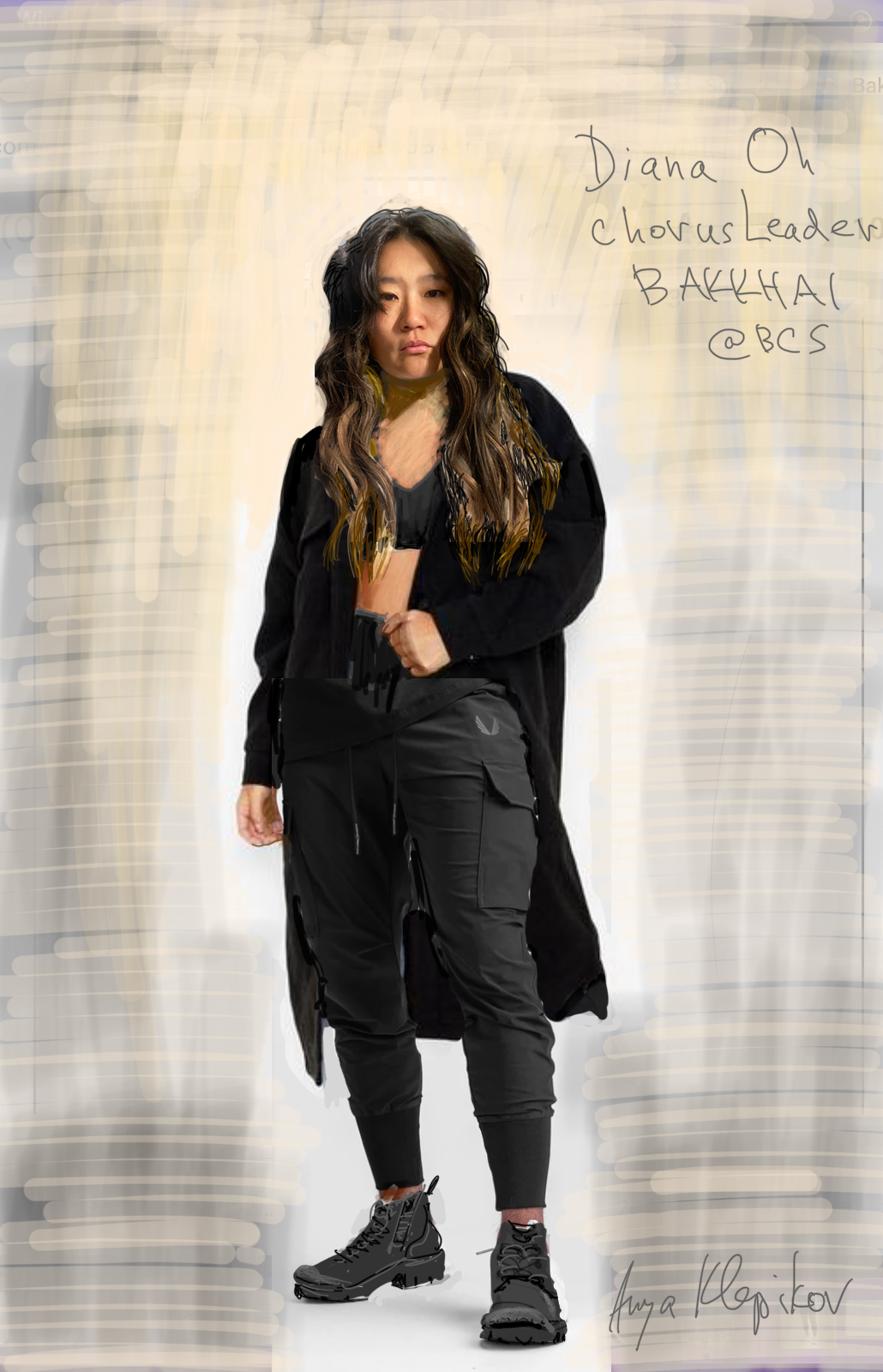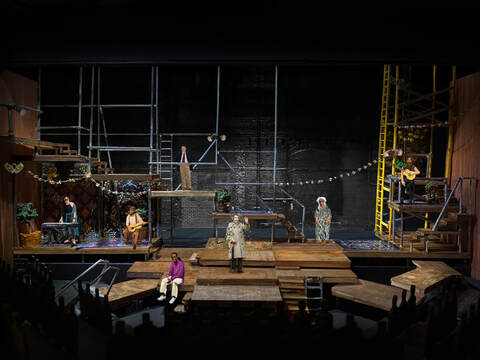Your source for Arts & Entertainment content, as well as fabulous human-interest stories, from Baltimore and beyond!
|
By Frankie Kujawa ‘This isn’t your English teacher’s Greek tragedy,’ boasts Baltimore Center Stage’s upcoming production of BAKKHAI by Anne Carson. Based on the Greek tragedy from Euripides, this new version has been described as ‘Burning Man in a theatre.’ Running from Wednesday, June 1st – Sunday, June 19th, BAKKHAI is a cautionary tale about the consequences of a civilization’s fear of the unknown. Featuring original music from the incomparable Diana Oh, debauchery, and a whole lot of wine, BAKKHAI will have audiences partying like it’s 399 BC. Having created and channeled the music of BAKKHAI, Diana Oh also performs in the production as the voice of the Bakkhai. Oh recently described the process that went into creating music for BAKKHAI, what Center Stage audiences can look forward to, and how this is the type of Greek play that will not make you want to ‘gouge your eyes out.’ Frankie Kujawa: What can audiences expect from this performance of BAKKHAI? Diana Oh: (Excitedly) Oh my gosh! A Greek play you’ll actually understand! The direction, the acting, the music of it is a true down-to-earth, elevated experience. I feel like people genuinely will want to be part of this. And I truly mean that as somebody who doesn’t have an entry point into Greek dramas. I don’t normally do work [with this genre] but I find myself thoroughly entertained, and I’m not lying to you! I texted Mike [Donahue, Director] and Cristina [Angeles, Associate Director], ‘You two are the only two directors who could ever make me ever want to act in a Greek play, and while watching the Greek play not want to gouge my eyes out.’ (Laughs) Frankie Kujawa: Could you talk a little about the original music that you have written for BAKKHAI? Diana Oh: I am really excited about it! You know, I come from a singer/songwriter/soul/concert background. And when I sing it’s usually in concert-form and the songs and lyrics are really personal. This production is my first time setting this [amount of] words that aren’t my own to music that I’ve made. And the reason why I said yes [to this production] was because I felt very ‘called’ to it. Mike [Donahue, Director] and Stephanie [Ybarra, Artistic Director] invited me in, and Stephanie knows both me and my work very well. So, I just felt like, ‘Ok, well there’s a reason I’m being called into this work.’ Getting together with Mike was so fun and so easy. I told him, (laughing) ‘I probably won’t read this play, but you tell me why you feel connected to it? What is your calling to it?’ He opened up and it was so easy. I was like, ‘I could collaborate with this person.’ And then he had the hard copy of the script with him, and I opened it and I immediately opened to a page of “lyrics.” I put “lyrics” in quotes because Anne Carson [playwright] writes in a suggestive way. Suddenly, the words cascade down the page and I opened it up and ‘heard’ the music immediately. Frankie Kujawa: Every artist has a process in which they create their work. Was there a specific process you followed in the creation of the music for this work? Diana Oh: Oh, yes! The process was really visceral, really guttural and really immediate. I think that the text asks for that. I feel like that was also the invitation I said ‘yes’ to, which was ‘Come as you are.’ So there wasn’t a lot of over thinking, which I really appreciated as a process. I read the lyrics before I even read the play, and I felt like I didn’t want to read [the play]. There was a part of me that thought, ‘I don’t want to get mired down into ripping apart the plot, the characters, the motivation of why this is happening.’ I was like, ‘Let me just sit with these words as if they’re lyrics somebody handed me.’ And, ‘Just let me write the way any singer/songwriter/person making songs would write.’ I don’t necessarily take to musical theater readily. It’s been a very exclusive art form in my upbringing of things. And, so that was really exciting as an artist; like from artist to artist, Anne Carson [playwright] who at this point feels like God because I don’t know who she is. I just know that she’s this huge presence that has written this ‘bible.’ (Laughs) And the assignment [for me was] being that I couldn’t change a word. I had to say every single word, and that was really exciting. I was like, ‘Now this is a fun game.’ And I really understood the words on a visceral, personal level. I genuinely love singing them just as much as I would love singing a song I had written, or words for myself. There’s just something there that allows for a real, human deep understanding. Frankie Kujawa: Having gone through the work to experience this performance on so many levels, what has BAKKHAI left upon you?
Diana Oh: Oh wow! You know, it’s still growing. Like every day I find another thing to be grateful for. I love that [BAKKHAI] is sacred. That [the artistic team] kept it sacred without it feeling exclusive. And my definition of sacred is the protection of joy, and the encouragement of that. You know, nobody is asking anybody to be something they’re not. And, I find, that once people start pretending to be something they’re not, then that’s the death of art. And this [performance] is just the opposite. It just doesn’t ask of that. I’ve never had that quite in conversation with a classic text. And this is probably the reason I fall asleep in anything written before 1960 - because it becomes very cerebral, very quickly. And there are certain people who are super into that and hang onto every single word. But, for me, I need something more visceral and earthy. Like, I want to show up to art in broken-in sneakers rather than stiletto heels, you know? And, a stiletto has it’s place, for sure, but comfort like this [performance] allows you to play artistically. Frankie Kujawa: What are you hoping audiences take away from BAKKHAI? Diana Oh: Validity. Being happy to be alive. Appreciative. Every time I watch a run of [BAKKHAI] because I’m both singing in it and having the immense pleasure of bearing witness to this artistry, I find that there’s so much joy in how seriously we are not taking [BAKKHAI] seriously. I just feel like it’s such a beautiful way of life right now. You know, to be in this ‘summer camp’ [way of looking] at things. To call the musical rehearsals ‘band camp’ and the musicians are like ‘band camp counselors.’ To just live in that space of – sure, we’re all artists and we take our art seriously, but we’re not taking life too seriously. As somebody who identifies as gender-fluid, I’ve seen this work as connecting with the divine feminine versus/in conversation with masculine efficiency. And I’m just obsessed with that conversation in general, as somebody who’s always super protective of divine feminine. I think we all have it within us, and it just has to be cared for, cultivated, and it is just as valid as masculine efficiency if not more. So, I hope that people also feel connected to their earthiness with this performance. For more information on the production, please visit: www.centerstage.org/plays-and-events/bakkhai/
0 Comments
Your comment will be posted after it is approved.
Leave a Reply. |
Archives
January 2024
Categories
All
|

